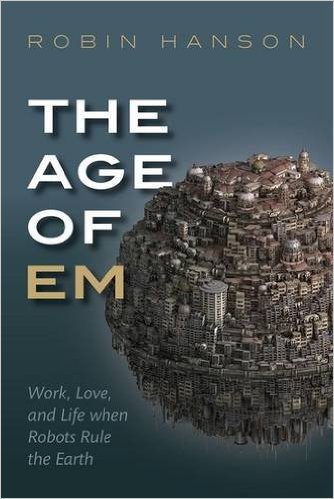*The Age of Em*, by Robin Hanson
That is the title of the new and forthcoming Robin Hanson book, due out in May. I was asked to supply a blurb, and offered two possibilities. One was:
“Robin Hanson is one of our most original and important thinkers. This is his book.”
The ostensible premise of the book is that people have become computer uploads, and we have an entirely new society to think about: how it works, what problems it has, and how it evolves. One key point about this new world is individuals can be copied. But this is more than just a nerdy tech book, it is also:
- Straussian commentary on the world we actually live in. We are already something-or-other, uploaded into humans,and very often Robin is describing our world in cloaked fashion, albeit with some slight tweaks to parameters for the purpose of moral illumination.
- A reminder of how strange everything is, and how we use self-deception to come to terms with that strangeness. It’s a mock of all those who believe in individual free will.
- An attempt to construct a fully rational theology, proving by various deductions that God is not fully benevolent in the traditional sense.
- An extended essay on the impossibility of avoiding theology, given the imposition of competitive constraints on a world where production and copying are possible. And ultimately it is a theodicy, though it will not feel that way to Westerners, Jews, Christians, or Muslims. It hearkens back to medieval theology, Descartes, and the idea of living in God’s possibly terrifying simulation.
- A satire on the rest of social science, and how we try to explain and predict the future.
- A meta-level growth model in which energy alone matters and the “fixed factor” assumptions of other models are relativized. Copying is taken seriously, besides how special are you anyway? In the meantime, we learn just how much of the world we know depends upon the presence of various fixed factors. But surely that is temporary!
- A challenge to our notions of wherein the true value of a life resides.
I hope enough readers pick up on some of this. And yes, there is a chapter on sex, love, and affairs.
It is hard to excerpt from this book, but here is one short bit:
Compared with humans, ems fear much less the death of the particular copy that they now are. Ems instead fear “mind theft,” that is, the theft of a copy of their mental state. Such a theft is both a threat to the economic order, and a plausible route to personal destitution or torture. While a few ems offer themselves as open source and free to copy, most ems work hard to prevent mind theft. Most long-distance physical travel is “beam me up” electronic travel, but done carefully to prevent mind theft.
I am wildly enthusiastic about everything the Robin upload does, and some of his copies are better yet. Here is the book’s home page.
Addendum: Here is Robin Hanson’s response.
